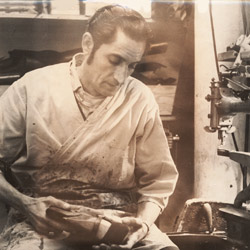Just a glance at the inside tag of a t-shirt reveals the same dependable set of information: size, type of material, cleaning instructions. But perhaps the most memorable statement reads: “Made in [insert foreign country here].” How times have changed in today’s world of globalization and outsourcing—and not just in the decline of American-made products.
Once upon a time, you learned a skill or trade, and that trade kept you gainfully employed for a lifetime. Yet today, when entire industries rise and fall in a matter of years, and the average worker holds eight to 10 different jobs throughout the course of his or her career, that concept seems positively quaint. Many worthwhile things are lost in this rush of exponential change.
An Age-Old Trade
A throwback to an earlier time, Fred’s Shoe Repair keeps alive a trade—cobbling—that has practically been left to the dustbin of history. Ray Khattar and his recently retired father, Fred Khattar, who still works several hours a day at his son’s shop, take great pride in the service they provide to their customers. It’s a service that requires skill, training, and just as importantly, the ability to improvise. Though the “shoe repair” part of the business’ name casts the Khattars as cobblers, the reality is that Fred’s Shoe Repair fixes more than just your shoes. “My business is recycling,” asserts Ray.
Offering expert repair of all kinds, Fred’s rescues coats, jeans, bags, luggage and seasonal items, such as baseball gloves, tents and awnings, and boat covers, from potential wreckage. Of course, they also practice “the fine art of shoe repairing”—a service that can be difficult to find today. “It’s a dying trade,” said Ray. “The younger generation doesn’t take over their mom-and-pop-type joints.”
Fred’s Shoe Repair is one of four similar businesses owned by members of the Khattar family. In 1986, Ray’s brother Anthony started his own shop in Peoria, before moving it to San Diego four years later. Today, he owns and operates three stores in the San Diego area under the name of Anthony’s Shoe Repair.
 Land of Opportunity
Land of Opportunity
Fred was the first in his family to specialize in cobbling. Born in Lebanon, he immigrated to the U.S. in 1957 in order to work and take advantage of “the land of opportunity.” While his father was a taxi driver, Fred developed a unique talent for cobbling. When he arrived in Peoria, it was a booming industrial town with a large population of Lebanese immigrants. Initially, he bounced around, doing work for various area shops, before he eventually found a steady job at the old Bergner’s department store in downtown Peoria.
Back then, Bergner’s housed nine other cobblers in its basement, a far cry from today, when repairs are consigned to specialty shops like Fred’s and a very few others in the area. In these times, when disposability trumps durability, it’s easy to forget that a large department store once held a fully functioning shop dedicated to such reclamation. Here in the store’s basement, Ray came to immerse himself in his father’s trade.
After classes let out for the day, Ray would take the bus to Bergner’s from Manual High School, where he would “hang out with my dad for a couple of hours until they closed.” At first, he “just watched,” admiring his father’s work, but Ray would soon find that cobbling and the other repairs that he would one day perform himself came naturally to him. “It was just in my blood.”
In 1971, Fred moved out of Bergner’s to start his own business on Prospect Road—the original Fred’s Shoe Repair. He ran this shop for more than 35 years, until a shoulder injury made it difficult to use his hammer in repair work, and he was forced to send many of his customers to Ray’s shop on University. Eventually, Fred closed the Prospect shop, and after a bit of discussion, went to work part-time for his son. On March 31st of this year, Ray moved his business to the intersection of University and Forrest Hill, a location that offers increased visibility and better parking.
The move coincided with a recent uptick in business for the shop, as Fred’s Shoe Repair has prospered, in spite of—or perhaps because of—the economic downturn. With consumers pinching pennies and scaling back budgets, the value of repair over replacement has come back into vogue. An increased focus on environmental sustainability may be another factor—Ray’s business is recycling, after all.
The Look of a Master
In a world so dominated by disposable products, there is true beauty in watching Fred and Ray Khattar breathe life back into something as commonplace as a shoe. When they speak of their work, it’s clear that they love what they do. You can see it in the glint in Ray’s eye and the way he interacts with his customers. When examining an item brought in for repair, Ray quickly scans it up and down, already making the alterations in his head. He’ll give his customers a knowing look—the look of a master letting you know that you’re in good hands. It’s what keeps them coming back again and again.
Although Fred’s original shop on Prospect is shuttered, his name remains a beacon of craftsmanship. After immigrating to this country—a strange new place where he could barely even speak the language—Fred has truly made a lasting mark.
“He came from nothing…[now] he’s got two boys that have, between us, four stores,” said Ray. The Khattars’ story is a classic fulfillment of the American Dream, but more than that, it’s a call from the past to the present that flows through every object that comes out of the shop. It’s quality craftsmanship, and it lets the community know that this isn’t just a shoe repair shop, it’s a way of life that should never be forgotten. iBi


